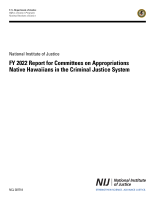Survey Research with Gang and Non-gang Members in Prison: Operational Lessons from the LoneStar Project
Journal
Trends in Organized Crime
Date Published
2022
Agencies
NIJ-Sponsored
Publication Type
Research (Applied/Empirical)



